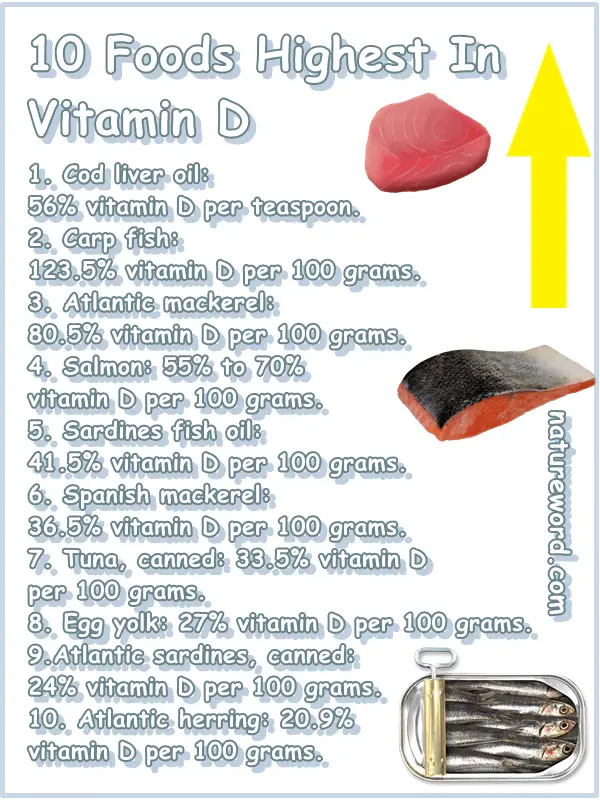How much vitamin D is there in foods? Is there such a thing as vitamin D rich foods? What are the best foods high in vitamin D to eat? Can you even get all of your daily vitamin D from food? Can you get too much vitamin D from foods and risk an overdose with associated side effects and symptoms?
While vitamin D occurs naturally in the foods we eat, the biggest part of our nutritional requirements for the vitamin is met from sunlight exposure, supplementation, or a mix of both. The content of vitamin D in foods is overall quite poor, with a few exceptions.

Vitamin D content in plant vs animal foods
When it comes to the vitamin D content of different foods, know that animal foods such as eggs, milk, dairy, meat and fish and seafood in particular are often high in vitamin D. Plant foods such as fruits, vegetables, nuts and seeds are not just low in vitamin D, but vitamin D free. In fact, most vegetarian foods are naturally devoid of vitamin D, unless fortified (e.g. breakfast cereal, protein bars, meal replacement options).
For example, fruits such as apples, mangoes, cherries, bananas, and most fruits, have no vitamin D at all. Also, pistachios, almonds and most other nuts and seeds are vitamin D free as well. By comparison, just one egg yolk from regular chicken eggs provides 4.5% of daily vitamin D values for an adult. 100 grams of egg yolk provides 27% of all the vitamin D an adult needs in a day. Animal foods such as egg yolk also further provide benefits for vitamin D absorption: the cholesterol in egg yolk helps the body absorb vitamin D from foods, and synthesize vitamin D obtained through sunlight exposure.

How much vitamin D do you need in a day?
As per the new dietary guidelines, the average adult needs an estimated of 20 mcg (micrograms) of vitamin D every day, which is the equivalent of 800 IU (international units). The old dietary guidelines recommended half the amount. The increase in daily vitamin D requirements has been driven by more and more studies showcasing the vital importance of the vitamin for good health.
What are the benefits of vitamin D?
Studies show vitamin D has a strong immunomodulating action and boosts the immune system response. Getting enough vitamin D every day is important for bone health, and contributes to better bone density and lower risks of osteoporosis, as well as improved fertility in both women and men. Vitamin D has been shown to reduce risks of breast cancer, as well as other types of cancer, and has scientifically proven anti-diabetic effects. There are receptors for vitamin D everywhere in the body, from the uterus and ovaries to the brain.
What foods are high in vitamin D?
What vegetables are high in vitamin D? Do fruits have a good content of vitamin D? Can you get all of your vitamin D from eating eggs? Is milk high in vitamin D? What types of meat do you have to eat to get all of your daily vitamin D? Are fish highest in vitamin D?
Few foods naturally contain vitamin D compared to the variety of foods available. Out of all foods that have vitamin D, very few have good amounts of it. As a general rule, plant foods don’t have any vitamin D at all.
However, vegetarian options such as bread, breakfast cereals, protein bars and shakes, non-dairy milk and various dairy and non-dairy beverages, various flours and more foods are typically fortified with vitamin D and good options to help you meet your daily requirements.
While you can’t get all of your daily vitamin D from eating just fruits, it’s very healthy to eat fresh fruit and, at the same time, enjoy sun exposure to fill up on vitamin D. Like fruits, vegetables too don’t have any vitamin D. Nuts and seeds are also vitamin D free.
Animal foods such as fish and seafood are excellent sources of vitamin D, while milk and dairy such as cheese, eggs and meat are good to modest sources. But know that cooking also lowers the vitamin D content of foods.
While you can overdose on vitamin D from dietary supplements, you can’t overdose on vitamin D from eating foods that contain it naturally. Even if you may sometimes eat too much of a good rich in vitamin D, beyond what is a reasonable intake. But do know that the body deposits excess vitamin D, and other fat soluble vitamins such as preformed vitamin A from animal foods.
10 Best Foods To Get Your Vitamin D
Cod liver oil
There are 250 mcg of vitamin D per 100 grams of cod liver oil, which is 12.5 times the recommended daily intake of vitamin D for an adult. There are 11.2 mcg of vitamin D in 1 teaspoon of cod liver oil, the equivalent of 56% of daily vitamin D values for an adult.
Carp
There are 24.7 mcg of vitamin D in 100 grams of raw carp fish, or 123.5% of all the vitamin D the average adult needs in a day. There are 21 mcg of vitamin D in 85 grams or 3 oz of raw carp fish, or 105% of all the vitamin D the average adult needs in a day. 1 fillet at an estimated weight of 218 grams provides 53.8 mcg of vitamin D, 0r 269% of all the vitamin D an adult needs in a day.
Atlantic mackerel, raw
There are 16.1 mcg of vitamin D per 100 grams of raw Atlantic mackerel, or 80.5% of daily vitamin D for an adult. There are 13.7 mcg of vitamin D per 85 grams or 3 oz of Atlantic mackerel, or 68.5% of daily vitamin D values. 1 fillet at an estimated weight of 112 grams provides 18 mcg of vitamin D, or 90% of daily vitamin D.
Salmon
There are 10.9 to 14 mcg of vitamin D in just 100 grams of raw salmon, the equivalent of 54.5% to 70% of total vitamin D requirements for a day for the average adult. A serving of 85 grams or 3 oz of salmon provides 9.26 to 12 mcg of vitamin D, or 46.3% to 60% of all the vitamin D an adult needs in a day.
Sardines fish oil
There are 8.3 mcg of vitamin D per 100 grams of sardines fish oil which is 41.5% of total daily vitamin D values for an adult. There are 0.373 mcg of vitamin D per 1 teaspoon of sardines fish oil, or 1.865% of daily vitamin D values. There are 1.13 mcg of vitamin D per 1 tablespoon of sardines fish oil, or 5.65% of daily values for an adult.
Spanish mackerel, raw
There are 7.3 mcg of vitamin D per 100 grams of Spanish mackerel (raw) which is 36.5% of total daily vitamin D values for an adult. There are 6.2 mcg of vitamin D per 85 grams or 3 oz of Spanish mackerel, or 31% of daily vitamin D values. There are 13.7 mcg of vitamin D per 1 fillet at an estimated weight of 187 grams, or 68.5% of daily values for an adult.
Tuna, canned in oil
There are 6.7 mcg of vitamin D in 100 grams of tuna, light, canned in oil, drained, or the equivalent of 33.5% of total vitamin D requirements for an adult. A serving of 85 grams or 3 oz of light tuna, canned in oil, drained solids provides 5.7 mcg of vitamin D, the equivalent of 28.5% daily vitamin D values for an adult.
Egg yolk
There are 5.4 mcg of vitamin D in 100 grams of chicken egg yolk, the equivalent of 27% of daily vitamin D requirements for an adult. There are 0.9 mcg of vitamin D in 1 egg yolk from regular chicken eggs, the equivalent of 4.5% of daily vitamin D values for an adult.
Atlantic sardines, canned
There are 4.8 mcg of vitamin D in 100 grams of Atlantic sardines, canned in oil, drained solids with bone, or the equivalent of 24% of daily vitamin D values for an adult. 1 can at an estimated weight of 92 grams or 3.75 oz of Atlantic sardines, drained solids, provides 4.42 mcg of vitamin D, or 22% of daily vitamin D requirements for an adult.
Atlantic herring, raw
There are 4.2 mcg of vitamin D per 100 grams of raw Atlantic herring, or 20.9% of daily vitamin D values for an adult. There are 3.57 mcg of vitamin D per 85 grams or 3 oz of raw Atlantic herring, or 17.8% of total daily vitamin D requirements. 1 fillet at an estimated weight of 184 grams provides 7.73 mcg of vitamin D, or 38.65% of daily vitamin D values.
